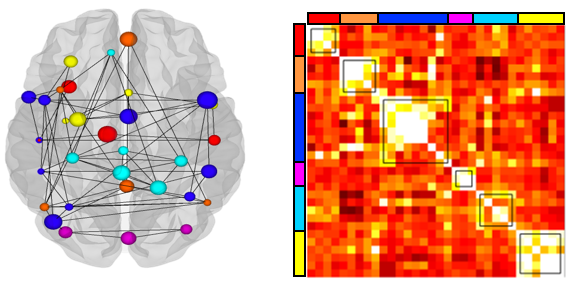The NeuroCognitive Translation Lab aims to advance fundamental theory and engineer cutting-edge methods within cognitive neuroscience to better understand and predict mental abilities, as well as patient health outcomes. We accomplish these aims through the study of typical and abnormal biopsychological phenomena. Our lab applies behavioral, brain imaging (e.g., fMRI, DTI, fNIRS), and computational (e.g., machine learning, network analyses) techniques to answer two research questions: (1) What can our neural and behavioral signatures tell us about our mental abilities?, and (2) How can we best leverage these signatures for predicting human health outcomes?

1. What can neural and behavioral signatures tell us about our mental abilities? This aspect of our research searches for fundamental features underlying human mental abilities. Our research has revealed basic mechanisms of interference-related forgetting in human memory (Hubbard et al., 2018), as well as the role of reward and executive systems in memory encoding (Hubbard et al., 2020a; Shah et al., 2020). We have isolated cognitive deficits in clinical populations, in hope of aiding identification of neurocognitive dysfunction and precision treatment approaches in these groups (Hubbard et al., 2016a, 2016b). Moreover, we have revealed that disruptions in activity or communication with attention-related brain areas may lead to deficits in memory and other cognitive abilities in clinical groups (e.g., Hubbard et al., 2014, 2016c, 2023a, 2023b; Roy et al., 2024; Turner et al., 2019).
2. How can we best leverage these signatures for predicting human health outcomes? The immense burden faced by people with psychiatric and neurological disorders implores research efforts directed at preventing and alleviating this burden. We apply neuroscience theory and methods to offer improved understanding, prediction, and, optimistically, guide precision treatment of clinical disorders. Here, we employ state-of-the-art neuroimaging and statistical modeling to discover “neuropredictors” of critical health outcomes (e.g., Auerbach et al., 2022, Morfini et al., 2025, Romer et al., 2025). For instance, using novel fMRI approaches, we demonstrated that deficits in the ability to metabolize oxygen may serve as a prognostic marker in multiple sclerosis and offer a neurophysiological target for treatment (Hubbard et al., 2018a, 2018b). Our work within the Boston Adolescent Neuroimaging of Depression and Anxiety consortium also employs cutting-edge brain imaging and clinical assessments to also better understand and predict anxious and depressive symptoms among adolescents (Pedroza-Sotelo et al., 2025 Hubbard et al., 2020b; Hubbard et al., 2023a; Hubbard et al., 2024; Siless et al., 2020).